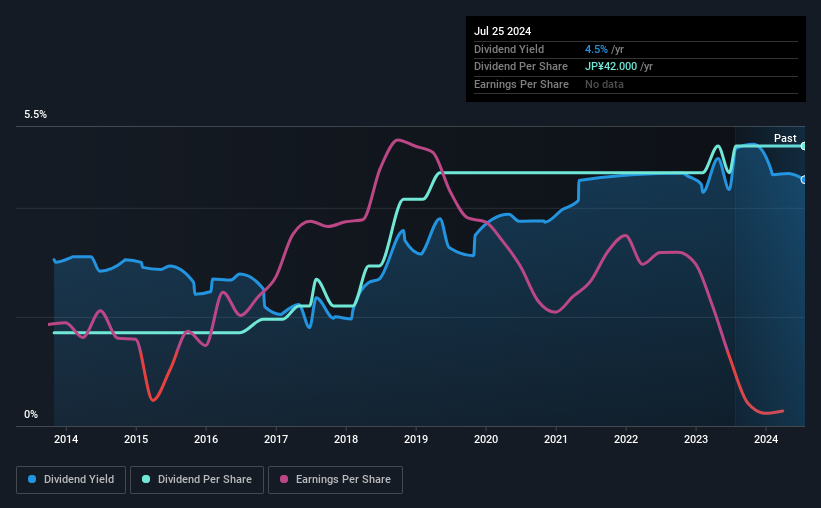Harima Chemicals Group (TSE:4410) Will Pay A Dividend Of ¥21.00
The board of Harima Chemicals Group, Inc. (TSE:4410) has announced that it will pay a dividend of ¥21.00 per share on the 4th of December. The dividend yield will be 4.5% based on this payment which is still above the industry average.
View our latest analysis for Harima Chemicals Group
Harima Chemicals Group's Distributions May Be Difficult To Sustain
If the payments aren't sustainable, a high yield for a few years won't matter that much. Despite not generating a profit, Harima Chemicals Group is still paying a dividend. Along with this, it is also not generating free cash flows, which raises concerns about the sustainability of the dividend.
Over the next year, EPS might fall by 41.0% based on recent performance. This means the company will be unprofitable and managers could face the tough choice between continuing to pay the dividend or taking pressure off the balance sheet.

Dividend Volatility
The company has a long dividend track record, but it doesn't look great with cuts in the past. Since 2014, the annual payment back then was ¥14.00, compared to the most recent full-year payment of ¥42.00. This implies that the company grew its distributions at a yearly rate of about 12% over that duration. Despite the rapid growth in the dividend over the past number of years, we have seen the payments go down the past as well, so that makes us cautious.
Dividend Growth Potential Is Shaky
Given that the dividend has been cut in the past, we need to check if earnings are growing and if that might lead to stronger dividends in the future. Harima Chemicals Group's earnings per share has shrunk at 41% a year over the past five years. This steep decline can indicate that the business is going through a tough time, which could constrain its ability to pay a larger dividend each year in the future.
Harima Chemicals Group's Dividend Doesn't Look Great
Overall, while some might be pleased that the dividend wasn't cut, we think this may help Harima Chemicals Group make more consistent payments in the future. The company isn't making enough to be paying as much as it is, and the other factors don't look particularly promising either. Overall, this doesn't get us very excited from an income standpoint.
Market movements attest to how highly valued a consistent dividend policy is compared to one which is more unpredictable. Still, investors need to consider a host of other factors, apart from dividend payments, when analysing a company. As an example, we've identified 3 warning signs for Harima Chemicals Group that you should be aware of before investing. If you are a dividend investor, you might also want to look at our curated list of high yield dividend stocks.
Valuation is complex, but we're here to simplify it.
Discover if Harima Chemicals Group might be undervalued or overvalued with our detailed analysis, featuring fair value estimates, potential risks, dividends, insider trades, and its financial condition.
Access Free AnalysisHave feedback on this article? Concerned about the content? Get in touch with us directly. Alternatively, email editorial-team (at) simplywallst.com.
This article by Simply Wall St is general in nature. We provide commentary based on historical data and analyst forecasts only using an unbiased methodology and our articles are not intended to be financial advice. It does not constitute a recommendation to buy or sell any stock, and does not take account of your objectives, or your financial situation. We aim to bring you long-term focused analysis driven by fundamental data. Note that our analysis may not factor in the latest price-sensitive company announcements or qualitative material. Simply Wall St has no position in any stocks mentioned.
Have feedback on this article? Concerned about the content? Get in touch with us directly. Alternatively, email editorial-team@simplywallst.com
About TSE:4410
Harima Chemicals Group
Primarily manufactures and sells various chemicals in Japan, China, rest of Asia, South and North America, Europe, and internationally.
Average dividend payer with slight risk.
Market Insights
Community Narratives



